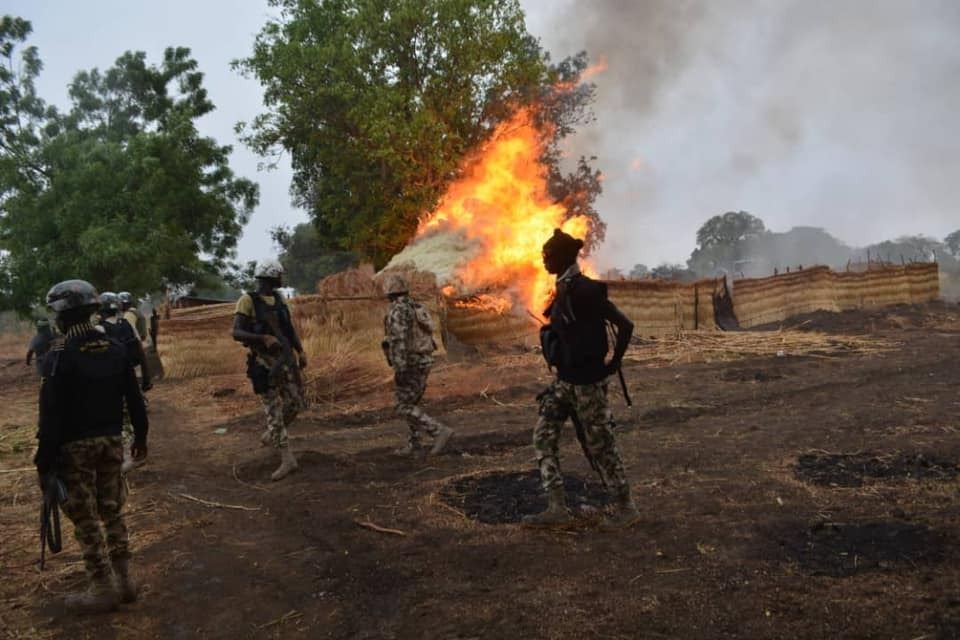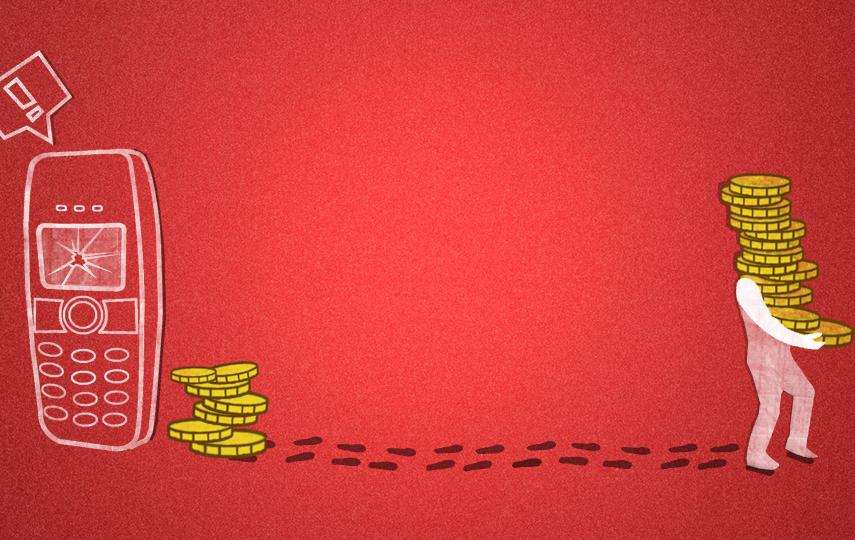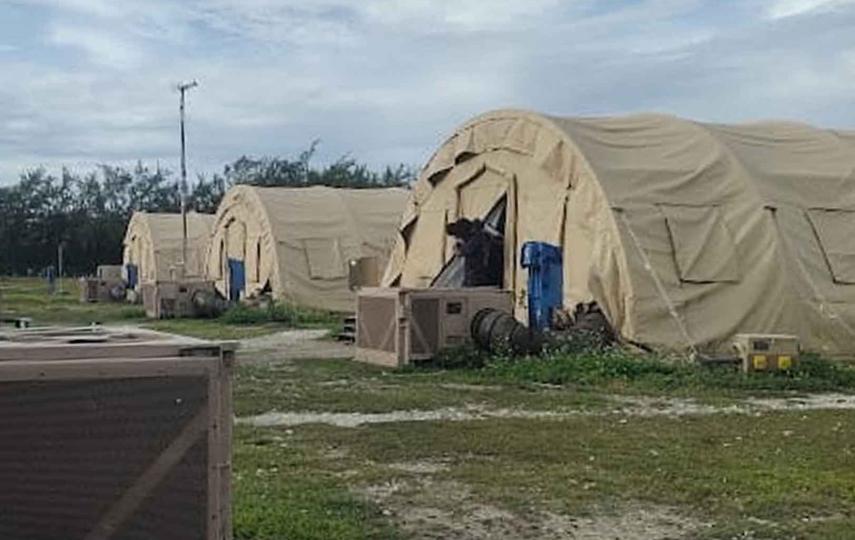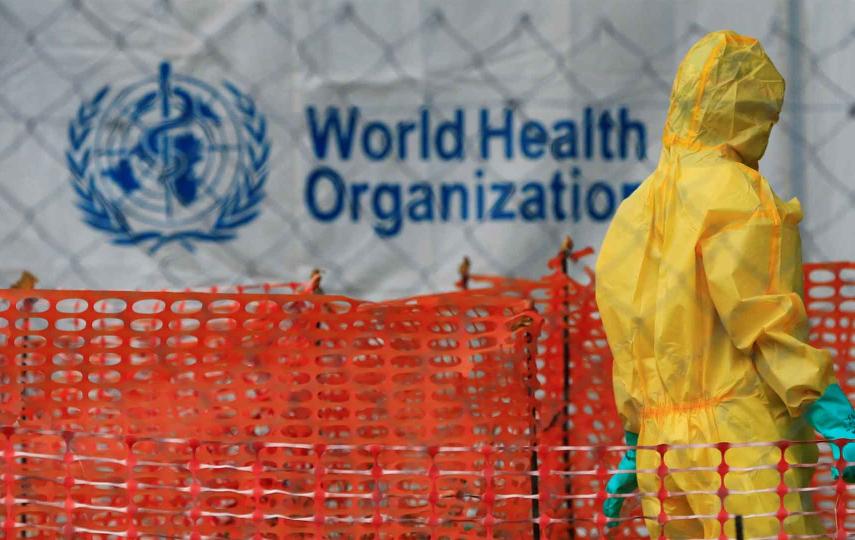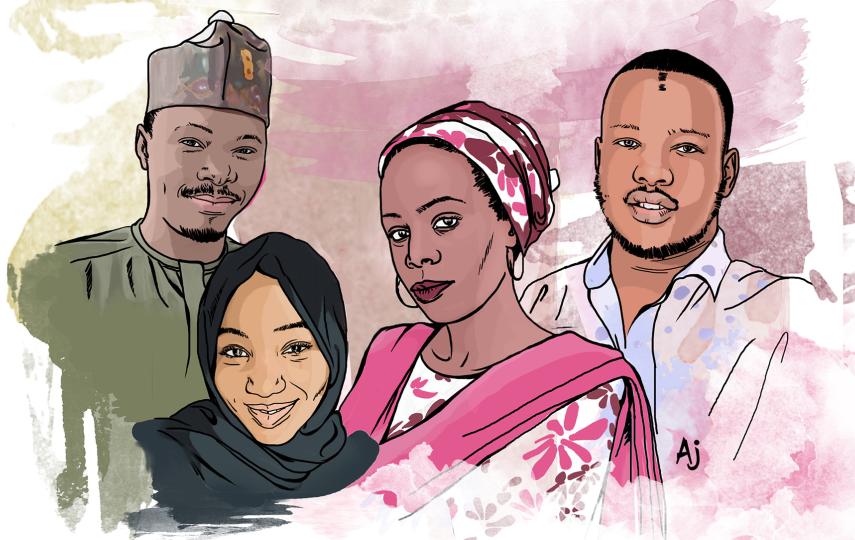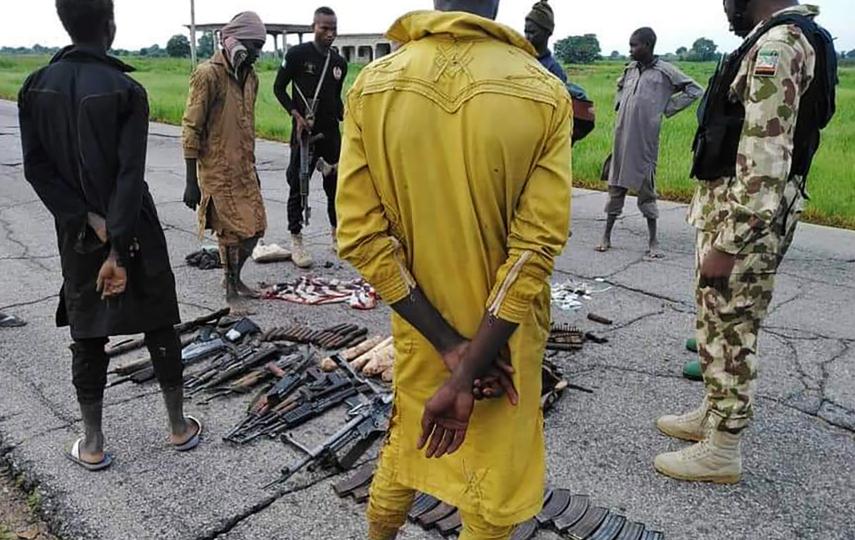At the first sound of gunfire from the approaching vehicles, Falmata* and the rest of her village scattered into the bush behind their homes – they knew what was coming.
The Nigerian military had destroyed Bula Ali village three times before, she recalled.
This time, the patrol arrived on a December morning in 2021 and began shooting. The uniformed soldiers then dismounted, and while some torched houses and stores of food, others rounded up livestock and loaded them onto their vehicles.
According to Falmata, eight civilians died that day, including two children, aged 10 and 15, alongside their mother, Bintu. An elderly man, Ba Modu, was also killed – too frail to run, he died when his home was set on fire while he was still inside.
Key findings: Evidence of violations committed by the Nigerian military
- Satellite imagery and testimonies suggest routine violations of international humanitarian law
- Civilians and villages targeted in counter-insurgency operations
- Hundreds of villages destroyed since 2010
- Villagers forcibly relocated to displaced persons camps
- Indiscriminate and disproportionate airstrikes launched on villages
- Military restrictions compromise humanitarian principles of neutrality
Bula Ali is no anomaly. In the 13-year war against jihadist groups in the northeast – collectively referred to as Boko Haram – the Nigerian military routinely launches what it terms “clearance” operations against communities it describes as insurgent strongholds. Entire villages are set alight, crops and livestock destroyed, and inhabitants scattered.
During a year-long investigation, The New Humanitarian and VICE News gathered satellite imagery, photographs, and videos – as well as dozens of testimonies from local and international aid workers, military experts, witnesses, and soldiers – that all support allegations of international humanitarian law (IHL) violations by the military. Some alleged violations occurred as recently as May this year.
HumAngle, a news outlet covering conflict and humanitarian issues in Africa, estimated that more than 200 villages had been destroyed since 2010 in the northern Lake Chad region alone.
Reporting and satellite imagery analysis from The New Humanitarian and VICE News, however, indicates that the total number of villages destroyed by a combination of the Nigerian military, local Civilian Joint Task Force (CJTF) militia, and foreign military units deployed as part of a regional Multinational Joint Task Force (MNJTF) that includes Chad, Cameroon, and Niger could stretch well into the hundreds.
“The soldiers think everyone living in the villages are Boko Haram, but there’s no Boko Haram staying in Bula Ali,” Falmata told The New Humanitarian and VICE News late last year in one of a series of interviews with survivors, who all spoke on the condition of anonymity, fearing reprisals. “We’re just caught in the middle.”
According to UN figures, the counter-insurgency war has directly and indirectly killed 350,000 people and uprooted 2.5 million more – 1.8 million of them in the northeastern state of Borno, the epicentre of the conflict.
It has also targeted a region in Nigeria where aid agencies are currently running a $1.3 billion humanitarian operation to reach 8.3 million people in need.
“There have always been rumours of atrocities, but we have never been granted the type of access [by the army] to check, let alone provide humanitarian assistance to people trapped behind the lines,” said Fred Eno, spokesperson for Matthias Schmale, the top UN official in Nigeria. “That’s why we need the international community to demand a thorough investigation.”
Many villagers interviewed by The New Humanitarian and VICE News said they were forced from their homes in clearance operations by the military, which failed to distinguish between civilians and jihadists who operate in the area.
Falmata, and many of the other villagers, are now homeless, stuck in a badly overcrowded camp for displaced people in Bama, the nearest town. Their once-productive farms abandoned, they are dependent on humanitarian aid.
“When the soldiers come, they don’t ask questions, they don’t listen. They just shoot and burn houses,” said Yusuf from Abbaram village. He also spoke on condition of anonymity, fearing reprisals from the military.
The new findings add to a growing body of evidence – including earlier work by Reuters, Amnesty International, and Human Rights Watch – which suggests rights violations by the Nigerian military are both ongoing and systematic.
Such violations include the use of disproportionate force in airstrikes that used unguided munitions on villages, as well as the destruction of civilian food stocks, according to villagers and analysts.
Wounded combatants have also likely been executed, in clear contravention of international humanitarian law.
The Nigerian military did not respond to questions at the time of publication, but have previously denied rights violations.
“The Nigerian authorities must thoroughly and promptly investigate the findings of this report,” said Amnesty International’s acting Nigeria director, Isa Sanusi, referring to the findings of this investigation by The New Humanitarian and VICE News, which were shared with the group in advance of publication.
The alleged violations have persisted under two presidents – Goodluck Jonathan and Muhammadu Buhari. Newly elected President Bola Tinubu, who was sworn in on 29 May after winning disputed elections earlier this year, replaced his predecessors’ military commanders earlier this month – a normal practice for an incoming head of state. But he has provided few clues if the security policy will change.
“The best thing [Tinubu] can do is to address the issue of IHL violations frontally,” said Idayat Hassan – the director of the Abuja-based think tank Centre for Democracy and Development, and an expert on the conflict in the northeast.
“Nigeria needs international support given the scale of its humanitarian problems, and these allegations damage that relationship.”
Beyond ‘the trench’
For years, there has been an uneasy relationship between humanitarian workers and the Nigerian military, which has challenged whether aid groups are truly neutral in the conflict – a core principle in humanitarian operations.
In 2019, Nigerian authorities temporarily closed the offices of Mercy Corps and Action Against Hunger in the northeast, accusing the relief agencies of aiding Boko Haram – an allegation repeatedly brandished against the broader humanitarian system, and denied by the two groups. Nigeria’s anti-terrorism law criminalises any contact with Boko Haram.
The killing of an aid worker by a soldier in the northeastern town of Damboa in November last year has had a further chilling effect.
“Humanitarians are just scared to get into any confrontation with the military,” an aid manager in the northeast told The New Humanitarian and VICE News. “What they do is very opaque. And we don’t have the bandwidth. We’re overwhelmed by the number of people we’re trying to help.”
Read more: The tension between aid agencies and the military
Nigeria has historically had a strained relationship with the humanitarian community. As a regional superpower, it struggles to come to terms with the aid industry’s presence – seeing it as both neo-colonial (though lucrative) and faintly embarrassing, aid workers told The New Humanitarian and VICE News.
The military and the Borno State government have separate axes to grind. The military has been accused of “stifling” relief operations. Concerned that relief could reach jihadist forces – especially the so-called 3 Fs (food, fuel, and fertiliser) – it restricts aid organisations from operating outside of government-controlled areas under the terms of the Terrorism Prevention Amendment Act, which criminalises contact with groups labelled as terrorists.
The military presents the restrictions as necessary for the protection of aid agencies, but they also compromise the humanitarian principles of neutrality and impartiality.
The Borno State government is equally antagonistic towards aid agencies. Governor Babagana Zulum has castigated what he regards as the deliberate institutionalisation of aid dependency as a means to fatten the budgets of unaccountable relief groups.
A single, overcrowded camp in the centre of Bama shelters around 50,000 displaced people. Conditions are difficult; those with friends and relations in the town move out as soon as they can.
Bama, 70 kilometres south of the regional capital, Maiduguri, is the second largest town in the northeast and close to Sambisa forest, a longstanding base of Boko Haram.
In 2014, Bama was captured by the jihadists, who massacred hundreds of townspeople before it was finally retaken by the Nigerian army a year later.
As the town has slowly recovered, there has been an influx of people from the countryside, attracted by the aid agencies and the relief they provide, and the growing trading opportunities.

Bama is also where the 21 Armoured Brigade, led by Brigadier General Adewale Adekeye, is based. Like other garrison towns, a five-kilometre-deep security perimeter – known as “the trench” – surrounds Bama.
Hardly any aid agencies work outside “the trench” – the only exception being the International Committee of the Red Cross, which has been granted special permission.
“They say that ‘if you’re outside the trench, you’re on your own… we won’t distinguish between you and the enemy’,” the director of one international NGO told The New Humanitarian and VICE News, recalling conversations with soldiers. The director spoke on condition of anonymity for fear of reprisals.
Read more: Overcrowded Bama
According to the Displacement Tracking Matrix run by the UN’s migration agency, IOM, more than 45,400 people left the countryside for Bama in 2022. Almost half of these movements – over 19,600 people – were a broad mix of voluntary relocation; people moving to improve their living conditions or because better security now allowed them to reach Bama.
But more than 12,300 people also arrived in Bama as a result of “military operations”. IOM officials explained that this was the result of the army “rescuing” people in the bush. In these cases – most of which occurred between May and August last year – the military trucked people directly to the IOM camp.
None of the displaced The New Humanitarian and VICE News interviewed – most of whom had walked to Bama after their villages had been destroyed – said they had been questioned by IOM over their motives for leaving the countryside. This would suggest IOM has possibly undercounted the numbers of civilians affected by military action.
There are advantages to moving to Bama. It has the second largest market in the northeast, and its gradual recovery is creating work and business opportunities for those with a little capital, a senior aid worker told The New Humanitarian and VICE News.
But the IDP camp is badly overcrowded, the state government has refused to provide additional land for its expansion, and the numbers in need mean that the time from registration by IOM to the first food ration can take three months.
That was one reason people from Bula Ali had resisted coming to Bama, said Falmata:
“Some had gone [to Bama and then] ran back: They said there was no food, no proper shelter.”
A mother with a newborn baby said she had registered with IOM three months earlier but still not received any food aid. “I’ve got the tag [as proof or registration] but got nothing,” she said. “There’s no support here, and sometimes I wonder why we came.”
There were similar grumbles from the other displaced The New Humanitarian and VICE News spoke to. Life in the countryside had been difficult because of Boko Haram harassment, but at least they had their farms and weren’t reliant on aid, many said.
Back in his village of Anbara, Daud was a wealthy and respected man. But here in Bama he has no work and complained that the monthly grain ration from IOM lasts his family just two weeks. His two wives take turns working on bean farms in northern Borno to make some money.
“There is one advantage of being here,” he told The New Humanitarian and VICE News. “Nobody will come with a gun and say, ‘Give me’. Here you can sleep peacefully.”
The displaced people interviewed described a precarious existence in the countryside, trying to manage the violence and intimidation of both the jihadists and military.
But whereas Boko Haram largely just tax people’s harvests at gunpoint and demand whatever they want, the military tends to regard every villager as a potential target.
Asked by reporters who they fear most, the universal answer was “the military”.
Video: “The soldiers told us that if we didn't move to Bama and stayed there, they would kill us all or take us away.”
“They are both wicked, but I can say the soldiers are worse,” said Abubakar from Anbara village, about 50 kilometres south of Bama. “They killed my two children [who had been returning from their farms]. Boko Haram took all my belongings, my cows, everything we made from farming, but the military killed my children.”
“They can easily kill you, destroy your house and everything that you have,” said Ali, who described how his village of Dauleri had been burnt almost every year over the past six years.
All the villagers interviewed said the military should have known it was attacking farmers, not jihadists.
“Nobody challenged the army when they came – nobody shot at them,” said Fatima, from Bula Chinguwa, 45 kilometres from Bama. “If Boko Haram had really been there, there would have been a fight.”
‘This is the field’
Nigeria, with a population of 220 million, is a major market and Western partner in the battle against jihadist expansion in Sahelian West Africa.
Once a mainstay of UN and regional peacekeeping operations, the reputation of the Nigerian military – both internationally and domestically – has crumbled over the course of the northeastern war.
Not only has the military’s professionalism been questioned, but it is also accused of being institutionally corrupt, overly politicised, and hamstrung by turf wars.
It also has a long history of alleged human rights violations.
“In every single theatre the military operates in, they burn – it’s just what they do.”
In the northeast, it has repeatedly been accused of extrajudicial killings, rape, torture, detentions without trial and, most recently, conducting forced abortions on women made pregnant by the insurgents, as well as the targeted killing of male children.
Read more: Military impunity
The Nigerian military has repeatedly been accused of human rights violations. The most high-profile cases include:
- The killing of more than 2,400 civilians in the southern town of Odi in 1999
- The destruction of the northeastern town of Baga in 2013 in which at least 200 people died
- The shooting of over 350 Shi’a demonstrators in northern Zaria in 2015
- The deaths of more than 60 protesters in the southeastern towns of Asaba and Onitsha in 2016
- The killing in 2020 of at least 11 young people campaigning against police brutality in the commercial capital, Lagos
There has been little or no public accountability for these incidents.
Part of the problem is the rules of engagement. “They need to be revised,” human rights activist Salaudeen Hashim told The New Humanitarian and VICE News. “They take a sledgehammer to everything when it’s not always the right tool.”
The air force has also been involved in repeated targeting errors that have killed hundreds of civilians, again with seeming impunity.
In 2017, more than 100 people died – including aid workers – when an IDP camp in Rann, in the northeast, was bombed, despite the military having its coordinates. In 2019, 13 civilians were killed in a strike on Gajigana village, north of Maiduguri, following an ISWAP attack on a military camp in the area.
In 2020, at least 17 people died in a village in northeastern Damboa district when the air force again hit the wrong target. At least a further dozen people were “erroneously killed” in northeastern Yobe state in September 2021 when a village was struck rather than a nearby “terrorist camp”. Two weeks later, another 50 civilians died when a fish market was bombed in the village of Daban Masara, an area under ISWAP control.
The war against “bandits” in the northwest has caused significant additional civilian casualties. Rather than the intended target of criminal gunmen, the air force accidentally killed more than 60 villagers in Zamfara state in December 2022. The same mistake was repeated a month later when close to 50 people died in an airstrike in central Nasarawa state. In January 2023, an air attack in Galadima-Kogo in Niger state killed 18 vigilante members rather than supposed “bandits”. The same strike also displaced more than 8,000 people.
In a report on the Nasarawa strike released in June, Human Rights Watch called for an investigation into military air operations and compensation for victims.
IHL is part of the curriculum of the Nigerian Defence Academy, the country’s officer training school. But the module is usually at the tail-end of the course, the week before passing out, “when nobody is paying much attention”, said Hashim, the human rights activist. “It should be integrated throughout the syllabus.”
A special panel of the National Human Rights Commission was launched in February this year to investigate a Reuters report in December 2022 on forced abortions. But the government-funded commission does not have a track record of holding powerful institutions like the military to account.
“There have been several panels investigating allegations of violations by Nigeria's military and other security agents, but there has been no meaningful accountability,” said Amnesty International’s Sanusi.
“There are no innocent people left in the bush.”
The Nigerian military is not alone in struggling to distinguish between armed combatants and civilians in counter-insurgency operations. From Afghanistan to Iraq, even the most sophisticated of Western armies have been accused of serious breaches of IHL.
The provisions of IHL are part of the training for Nigerian officers.
“But intellectually and consciously, they reject the concept,” said one humanitarian officer who interacts with the military high command in Maiduguri. “They say: ‘It’s good for the books and for academics, but this is the field’.”
Soldiers in Bama admit they are deeply distrustful of rural communities.
“They are all Boko Haram,” noted a sergeant and four-year veteran of the area, who spoke on condition of anonymity because he wasn’t authorised to speak about operations. “We set fire to their houses, and they rebuild. You cannot stay there if you are not Boko Haram; it means they have that way of thinking in them.”
Failure to move to Bama is seen by the military as almost proof of allegiance to the jihadists. “When an attack is on, it’s their chance to find a way to come out. Those that don’t leave are with them,” said another corporal. “There are no innocent people left in the bush.”
Video: “People in our village have nothing to do with Boko Haram”
“Western governments don’t say it publicly, but they accept civilian casualties as collateral damage in their [counter-insurgency operations] around the world,” said the director of one international NGO, who spoke on condition of anonymity due to the friction between the military and NGOs. “The Nigerian military doesn’t feel any pressure to do things differently.”
Read more: International arms sales
Although economic ties are strong, Nigeria has historically maintained an arms length non-aligned policy with Western governments. Militarily, it has bought equipment – and sought training – from both East and West.
The purchase of US weapons has also been impacted by the “Leahy Law”, which prohibits Washington from providing equipment and training to foreign military units suspected of committing “gross human rights violations”.
In 2018, those restrictions were lifted with the $500 million sale of 12 Turcano light attack aircraft that were delivered in 2021. The United States also approved the $997 million sale of 12 AH-1Z ‘Viper’ attack helicopters (including training, munitions, related equipment, and maintenance support). US and UK instructors help train Nigerian forces.
Meanwhile, China is rapidly expanding its arms sales, reportedly aiming to become the dominant supplier to Nigeria, overtaking Russia. Nigeria is one of the region’s largest arms importers.
Despite the Nigerian military’s history of rights violations, it is regarded by Western governments as an important regional partner.
The Nigerian air force has also been accused of indiscriminate and disproportionate attacks on villages and civilian locations that are in direct violation of the rules of war.
However, a scorched earth culture is deeply ingrained within the Nigerian military, according to a former soldier and now security expert who spoke to researchers.
“There are no official orders. It’s more an attitude than a policy thing,” he noted, asking to remain anonymous so he could speak freely. “In every single theatre the military operates in, they burn – it’s just what they do.”
Video: Witness claims it was the Nigerian army that burnt down his village
Due to the remoteness of rural villages, and the lack of communications, non-combatant casualties have typically gone unreported.
The army also routinely reports that the majority of the alleged insurgents have been killed outright or managed to escape capture – language that suggests that wounded combatants are rarely captured alive.
Combatants in non-state armed groups like Boko Haram – incapacitated or otherwise incapable of fighting due to injuries – are legally protected under IHL as persons ‘hors de combat’.
A corporal, based in Bama, said soldiers are governed by a strict military code. But in reality – and especially for surrendering combatants – “if there are no phones or anything around, you just ‘clear’ that person”.
No other soldiers, out of eight interviewed by The New Humanitarian, admitted to unlawful killings.
Losing ‘hearts and minds’
The original Boko Haram, Jamā'at Ahl as-Sunnah lid-Da'wah wa'l-Jihād (JAS), was led by Abubakar Shekau.
A split in 2016 saw the emergence of the so-called Islamic State of West Africa Province (ISWAP), which has developed into a far more potent – and politically savvy force – operating in northern Borno.
In 2018, a string of isolated forward operating bases along the fringes of Lake Chad were being overrun by ISWAP, enabling the group to develop a supply route to neighbouring Niger.
It was then that the military abandoned its tactic of maintaining such bases and launched a so-called “super camp” strategy, with troops concentrated in more easily defendable garrison towns.
Now, it’s from towns like Bama that aid agencies access those in need.
Video: A witness speaks of Nigerian army shooting and killing people in his village
While critics argue that the strategy has abandoned the countryside and rural population to the jihadists, the military counters that it now mounts regular long-range patrols, often backed by air cover, to “dominate” the territory.
A senior member of the CJTF militia in Bama – which often accompanies the military on operations as the local “eyes and ears” – explained what that can entail.
“There are two types of operations: You can go for a day or two and come back, or you can spend two to three weeks,” he said. “If it’s a day or two, our trucks carry the food and animals away [from the villages attacked] back to Bama.”
“But if the target is ahead, you set the village on fire and move on. On these missions, we kill all the animals. If there are food items, burn it. If there’s a farm, we enter with our vehicles and scatter the farm, so hunger will make [the villagers] come to Bama.”
Since the split within the jihadist movement in 2021, the Nigerian government has welcomed the defection of former fighters – accompanied by family members and villagers under their control who fled with them.
They undergo “screening” and a rudimentary “deradicalisation” in three reception centres in Maiduguri.
Separately, hundreds of other ex-insurgents have gone through a more formal and much older initiative known as Operation Safe Corridor.
The military describes those sent to this programme as “low-risk” Boko Haram. But in reality, the majority of those enrolled are said not to be fighters – another indication of the military’s difficulty in distinguishing between civilians and combatants.
Still, by inviting defectors into rehabilitation schemes that could allow them to eventually return safely to civilian life, the military has recognised the strategic value of disarming its adversaries by guile rather than slugging it out on the battlefield.
Nigeria’s war in the northeast is not only a military contest but also a political battle.
Jihadist propaganda portrays the military as vicious killers, and promises “a better life” for Muslims who join them, noted another Nigerian analyst, who writes extensively on the conflict in the northeast and asked that his name not be used because of his continuing research. The challenge for the Nigerian state is to prove that is false, he added.
Yet the rights violations and intimidation of the local population in the zones of military operations in the northeast runs counter to any “hearts and minds” goal – generally recognised as a key component of any counterinsurgency strategy.
A number of analysts have pointed to the need for security sector reform in Nigeria.
However, for Hassan, director of the Abuja-based think tank, “it’s less about training and much more about ending impunity”.
“When people are held to account – not just a few officers, but the topmost hierarchy – that’s what will deter IHL violations.”
*Names have been changed to protect the identity of survivors who feared retaliation from the Nigerian military and authorities. The names of those killed are real. Others interviewed by reporters spoke on condition of anonymity due to the sensitive nature of their work in Nigeria.
Additional research and satellite imagery analysis by Josh Lyons.
